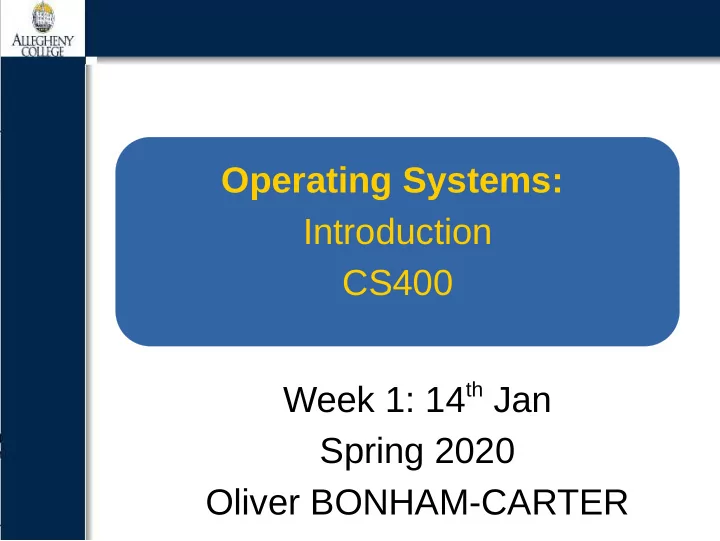

Operating Systems: Introduction CS400 Week 1: 14 th Jan Spring 2020 Oliver BONHAM-CARTER
Introduction ● What is an operating system? ● Where would I find them? ● What do they do? ● What happens if they do not work?
What is an OS? ● A layer of software that manages a computer's resources (software and hardware), as well as the interactions of the user. ● A management system for different programs running at the same time, allowing access the computer's central processing unit (CPU), memory, storage, and other resources in a controlled way. The operating system coordinates all access to resources to avoid system locks ● In short: they run your computer, smart phone, mobile device, ipad, chip set, etc ...
What is an OS? ● The most important software on a device. ● Allows all software, processes and resources to run together ● Software, memory and hardware to communicate ● Abstraction : users control the machine without using direct machine language (more on this later!)
Major Types of OS’s? ● Three most common operating systems for personal computers are Microsoft Windows, macOS, and Linux. ● Modern operating systems use a graphical user interfaces to let you interact visually with software using a combination of graphics and text.
MS Windows See all versions of MS Windows (video): https://www.youtube.com/watch?v=ckboyrXSgH8
MS Windows
MS Windows Blue Screens See all “blue screen of death” of MS Windows (video): https://www.youtube.com/watch?v=Q9B8XYKotDk
Linux and Some Varieties
Unix
More Unix Variants UNICOS Irix AIX
MacOS According to StatCounter Global Stats, MacOS users account for less than 10% of global operating systems. This is compared to the percentage of Windows users, 80%.
Other Types of OS’s? ● Variants of Linux, Unix, and lesser-known ones. ● Early development OSs ● Specific application types of OSs ● Mobile devices, specific hardware controllers, etc.
Ms DOS (1980's – 1990's) ● MS Disk Operating System (Before Windows) ● Single tasking (not multi- tasking) See all versions of MSDOS (video): https://www.youtube.com/watch?v=5cS-PIuyEhU
Other DOS's? ● Digital Research Dos
IBM OS/2 Warp (1990's)
BeOS (1990's)
Haiku (compatible with BeOS) 2001 - present Learn more: https://www.haiku-os.org/
Phones, Mobile devices All devices need some kind of OS to function
Consider this… Group Discussion Go online to find a small software that is an ● OS, or fulfills a role as one. Discuss as a group. You could even choose one from these slides. What are the main differences between this – OS and other popular OS’s? (i.e., MacOS, Windows, Linux) Why was your OS developed? – What does the media report about the OS? – What sorts of functions does this OS – provide? Please write down your discussion points to help you introduce your OS to the class.
Recommend
More recommend